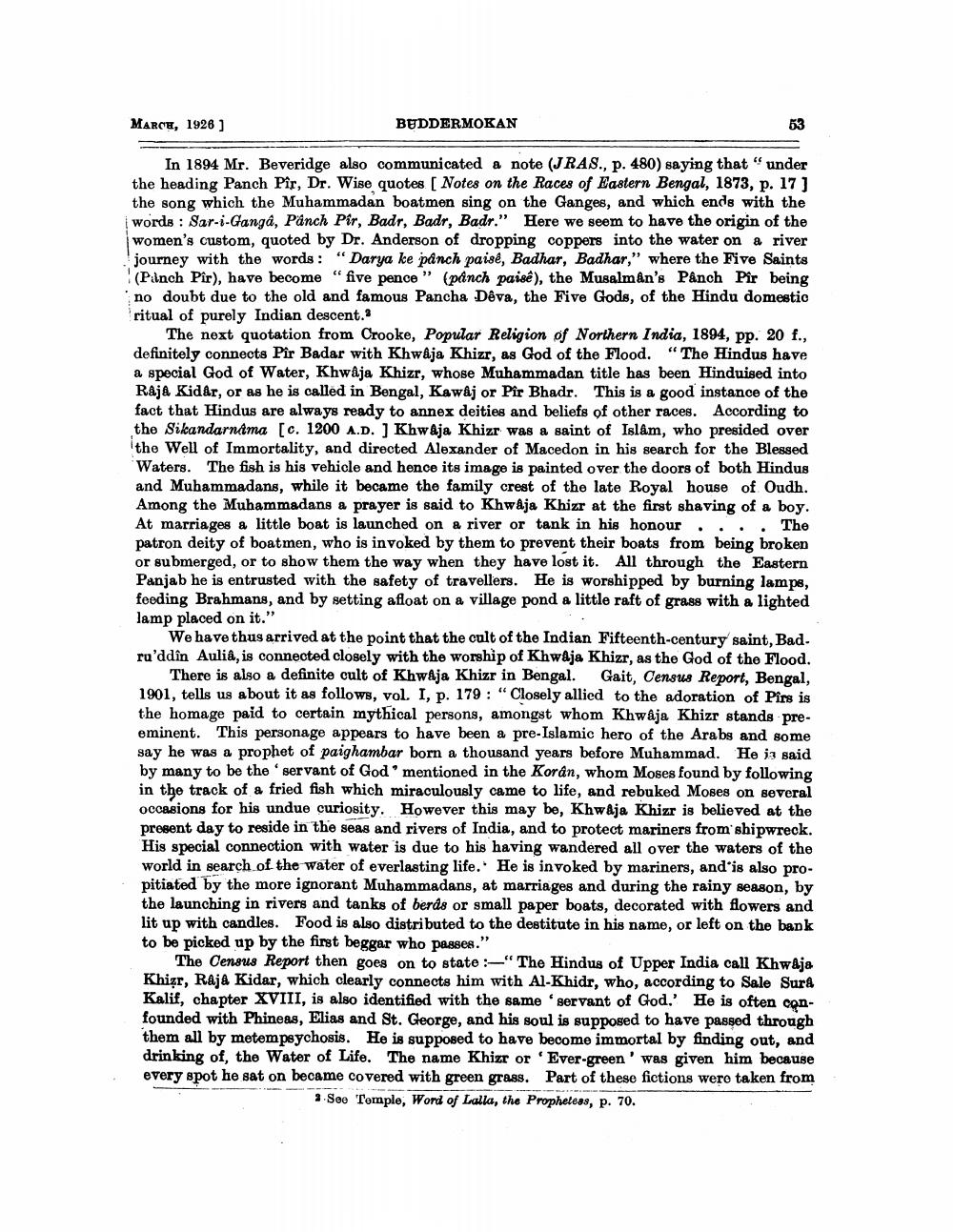________________
MARCE, 1926 )
BUDDERMOKAN
53
In 1894 Mr. Beveridge also communicated a note (JRAS., p. 480) saying that "under the heading Panch Pir, Dr. Wise quotes [ Notes on the Races of Eastern Bengal, 1873, p. 17 ] the song which the Muhammadan boatmen sing on the Ganges, and which ends with the words : Sar-i-Gangá, Panch Pir, Badr, Badr, Badr." Here we seem to have the origin of the women's custom, quoted by Dr. Anderson of dropping coppers into the water on a river journey with the words: “Darya ke pånch paise, Badhar, Badhar," where the Five Saints (Pinch Pir), have become “five pence" (panch paise), the Musalman's Panch Pir being no doubt due to the old and famous Pancha Dêva, the Five Gods, of the Hindu domestic ritual of purely Indian descent.
The next quotation from Crooke, Popular Religion of Northern India, 1894, pp. 20 f., definitely connects Pir Badar with Khwaja Khizr, as God of the Flood. "The Hindus have a special God of Water, Khwaja Khizr, whose Muhammadan title has been Hinduised into Raja Kidár, or as he is called in Bengal, Kawaj or Pir Bhadr. This is a good instance of the fact that Hindus are always ready to annex deities and beliefs of other races. According to the Sikandarnama [c. 1200 A.D. ] Khwaja Khizr was a saint of Islam, who presided over the Well of Immortality, and directed Alexander of Macedon in his search for the Blessed Waters. The fish is his vehicle and hence its image is painted over the doors of both Hindus and Muhammadans, while it became the family crest of the late Royal house of Oudh. Among the Muhammadans a prayer is said to Khwaja Khizr at the first shaving of a boy. At marriages a little boat is launched on a river or tank in his honour .... The patron deity of boatmen, who is invoked by them to prevent their boats from being broken or submerged, or to show them the way when they have lost it. All through the Eastern Panjab he is entrusted with the safety of travellers. He is worshipped by burning lamps, feeding Brahmans, and by setting afloat on a village pond a little raft of grass with a lighted lamp placed on it."
We have thus arrived at the point that the cult of the Indian Fifteenth-century saint, Bad. ru'ddîn Aulia, is connected closely with the worship of Khwaja Khizr, as the God of the Flood.
There is also a definite cult of Khwaja Khizr in Bengal. Gait, Census Report, Bengal, 1901, tells us about it as follows, vol. I, p. 179: "Closely allied to the adoration of Pirs is the homage paid to certain mythical persons, amongst whom Khwaja Khizr stands preeminent. This personage appears to have been a pre-Islamic hero of the Arabs and some say he was a prophet of paighambar born a thousand years before Muhammad. He ja said by many to be the servant of God ' mentioned in the Koran, whom Moses found by following in the track of a fried fish which miraculously came to life, and rebuked Moses on several occasions for his undue curiosity. However this may be, Khwaja Khizr is believed at the present day to reside in the seas and rivers of India, and to protect mariners from shipwreck. His special connection with water is due to his having wandered all over the waters of the world in search of the water of everlasting life. He is invoked by mariners, and is also propitiated by the more ignorant Muhammadans, at marriages and during the rainy season, by the launching in rivers and tanks of berds or small paper boats, decorated with flowers and lit up with candles. Food is also distributed to the destitute in his name, or left on the bank to be picked up by the first beggar who passes."
The Census Report then goes on to state "The Hindus of Upper India call Khwaja Khizr. Raja Kidar, which clearly connects him with Al-Khidr, who, according to Sale Sura Kalif, chapter XVIII, is also identified with the same servant of God. He is often confounded with Phineas, Elias and St. George, and his soul is supposed to have passed through them all by metem psychosis. He is supposed to have become immortal by finding out, and drinking of the Water of Life. The name Khizr or Ever-green' was given him because every spot he sat on became covered with green grass. Part of these fictions were taken from
3.Soo Tomple, Word of Lalla, the Prophetess, p. 70.




